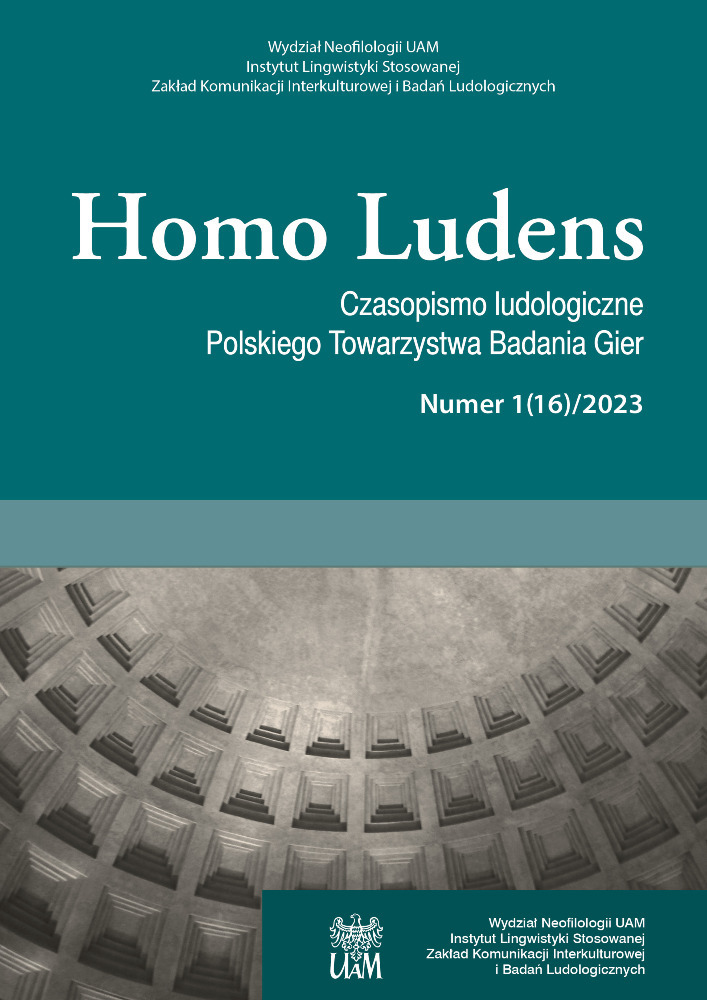Abstrakt
Gry komputerowe są przykładem aktywności, która pozwala na doświadczanie historii w interaktywny sposób. Niniejszy artykuł opiera się na badaniu gier historycznych w ramach dyskusji nad rolą gier komputerowych w edukacji historycznej. Autorzy stworzyli unikalne narzędzie analizy treści, które pozwala określić stopień wierności realiom historycznym w każdej grze. Na podstawie obserwacji rynku gier wideo autorzy sklasyfikowali 40 gier komputerowych w trzech odrębnych kategoriach: gry autentyczne historycznie, gry częściowo wierne realiom oraz gry quasi-historyczne.
Bibliografia
Amielańczyk, M. (18 czerwca 2020). This War of Mine: Już oficjalnie obok „Pana Tadeusza”. Online: <https://polskigamedev.pl/this-war-of-mine-juz-oficjalnie-obok-pana-tadeusza>. Data dostępu: 19 listopada 2023.
Badanienalogow.pl (2 stycznia 2023). Statystyki gier komputerowych w Polsce. Online: <https://badanienalogow.pl/statystyki-gier-kom-puterowych-w-polsce>. Data dostępu: 19 listopada 2023.
Bembeneck, E. (19 stycznia 2011). History as Context: Civilization V. Online: <https://www.playthepast.org/?p=593>. Data dostępu: 9 listopada 2023. Chapman, A., Foka, A., Westin, J. (2017). Introduction: What Is HistoricalGame Studies? Rethinking History, 21(3), 358–71. DOI: https://doi.org/10.1080/13642529.2016.1256638
Chapman, A. (2016). Digital Games as History: How Videogames Represent the Past and Offer Access to Historical Practice. New York: Routledge. DOI: https://doi.org/10.4324/9781315732060
Domańska, E. (2006). Historie niekonwencjonalne: refleksja o przeszłości w nowej humanistyce. Poznań: Wydawnictwo Poznańskie.
Jasitczak, J. (2022). Kilka uwag na temat nauczania historii. Acta Universitatis Lodziensis. Folia Historica, (110), 417–425. DOI: https://doi.org/10.18778/0208-6050.110.21
Jonckheere, N. et al. (2023). Playing with history in World of Tanks: Negotiated readings, historical realism and cultural memory. Convergence, 29(3), 641–657. DOI: https://doi.org/10.1177/13548565221130891
Kapell, M., Elliott A.B.R. (eds.) (2013). Playing with the past: Digital games and the simulation of history. New York: Bloomsbury Publishing USA. Mayring, P. (2014). Qualitative content analysis: Theoretical foundation, basic procedures and software solution, 18–44. Online: <https://www.ssoar.info/ssoar/handle/document/39517>. Data dostępu: 28 lutego 2024.
Mochocki, M. (2022). Editorial: Games with History, Heritage, and Provocation. Games and Culture, 6(17), 839–842. DOI: https://doi.org/10.1177/15554120221119268
Mochocki, M. (2017). Gry sarmackie w ujęciu anglo-amerykańskich heritage studies. Homo Ludens, 10(1), 151–190.
Mochocki, M. (2021). Heritage Sites and Video Games: Questions of Authenticity and Immersion. Games and Culture, 16(8), 951–977. DOI: https://doi.org/10.1177/15554120211005369
Mochocki, M. (2011). Sarmackie dziedzictwo kulturowe w grze fabularnej Dzikie Pola. Homo Ludens, 3(1), 139–154.
Potzsch, H., Sisler, V. (2019). Playing Cultural Memory: Framing History in Call of Duty: Black Ops and Czechoslovakia 38-89: Assassination. Games and Culture, 14(1), 3–25. DOI: https://doi.org/10.1177/1555412016638603
Politopoulos, A. et al. (2019). ,,History Is Our Playground”: Action and Authenticity in Assassin’s Creed: Odyssey. Advances in Archaeological Practice, 7(3), 317–323. DOI: https://doi.org/10.1017/aap.2019.30
Rosenstone, R. A. (2001). The historical film: Looking at the past in a postliterate age. W: M. Landy (ed.). The Historical Film: History and Memory in Media (s. 50–66). New Brunswick: Rutgers University Press.
Rüth, M., Kaspar, K. (2021). Commercial video games in school teaching: Two mixed methods case studies on students’ reflection processes. Frontiers in psychology, 11, 594013. DOI: https://doi.org/10.3389/fpsyg.2020.594013
Taranilla, R.V. et al. (2022). Strolling through a City of the Roman Empire: An Analysis of the Potential of Virtual Reality to Teach History in Primary Education. Interactive Learning Environments, 30(4), 608–618. DOI: https://doi.org/10.1080/10494820.2019.1674886
Shaw, A. (2015). The Tyranny of Realism: Historical accuracy and politics of representation in Assassin’s Creed III. Loading..., 9(14), 4–21.
Spring, D. (2015). Gaming history: computer and video games as historical scholarship. Rethinking History, 19(2), 207–221. London: Routledge. DOI: https://doi.org/10.1080/13642529.2014.973714
Ziemiańczyk, A. (30 czerwca 2022). This War of Mine – gra komputerowa na liście lektur szkolnych. Online: <https://trojka.polskieradio.pl/artykul/2990811,this-war-of-mine-gra-komputerowa-na-liscie-lektur-szkolnych>. Data dostępu: 19 listopada 2023.
Creative Assembly (2004). Rome: Total War (PC). Licomp, Polska
Firaxis Games (2010). Sid Meier’s Civilization V (PC). Cenega S.A., Polska.
Licencja
Prawa autorskie (c) 2024 Maria Lipińska , Jakub Chudzik , Ryszard Niziński

Utwór dostępny jest na licencji Creative Commons Uznanie autorstwa – Użycie niekomercyjne – Bez utworów zależnych 4.0 Międzynarodowe.
Szczegółowe informacje dotyczące prawa autorskiego zawarte są w umowie podpisywanej między wydawcą a autorem.
